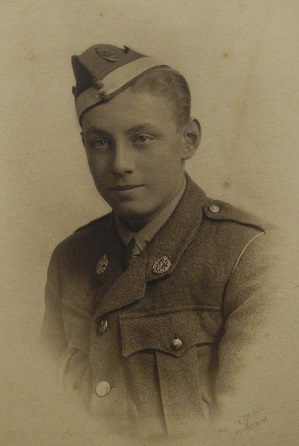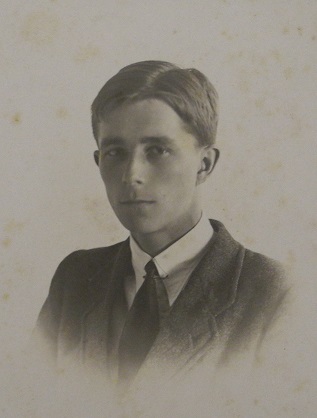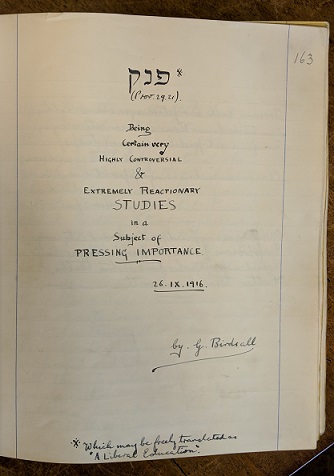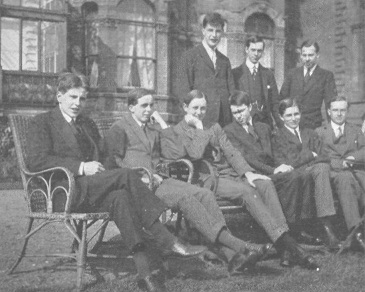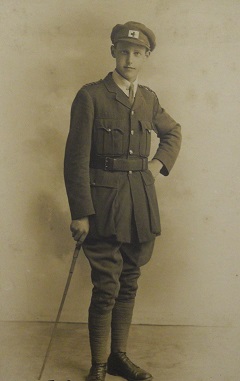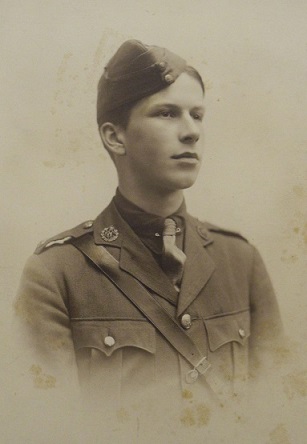
Oliver Bell, of Cheshire, was killed in action on 24th August, 1918, aged 20 years.
He attended Bootham School from 1913 to 1916. He was a cricketer and a member of the school Natural History Society.
The school magazine, “Bootham”, of March 1914 contains The Eightieth Annual Report of Bootham School Natural History, Literary & Polytechnic Society January, 1914.
In the report of Christmas Show, Botany Section, we read:
“Bell, however, secured the second prize for the Floral Calendar.”
and in the same issue, “Pets” report:
“During the summer lizards were kept (and subsequently lost) by Shaw, Bell, Strange and others. Many of them have since been discovered in various parts of the premises.”
and in the same issue, “Prizes”, Oliver got a prize for Presses in the Workshop section.
In the following year, Oliver won prize for “Bedtable,Tray” in the Workshop section.
“Bootham” of December 1915 contains cricket report:
“SECOND XI. (Boys’) RESULTS.
June 9, v. ARCHBISHOP HOLGATE’S, Home. Lost, 60 and 54—54 and 66. Although we won on the first innings, our opponents just pulled off the game in the second innings. Bell took seven wickets for 21 runs.
June 16, v. BRIDLINGTON G.S., Away. Won, 186 for 9—46. The first victory of the season. Lean made 39, Hamilton 31, and Strange 20. Bell took five wickets for 24.”
In 1916, Oliver became a Librarian of the school Natural History Society.
“Bootham”, of October 1916, lists cricket Matches:
“ARCHBISHOP HOLGATE’S, June 7, Away. Won, 57—44. On a “mountainous” wicket the bowlers on both sides did well. Bell’s rapidly-scored 13 saved us from defeat. Bell took two wickets for 1 run”
In the Royal Life Saving Society Awards: July, 1916, Oliver achieved a Bronze Medallion.
The same issue of “Bootham contains Oliver’s “Bene Decessit” entry:
“O. BELL was best known in the realms of sport. He obtained his 1st eleven colours at cricket and his 2nd eleven colours at football. He was a fives player and an able tennis player. He was a librarian, and leaves from the Lower Senior.”
In December 1917, “Bootham” reports, in “Across the Months”:
“OLIVER BELL (1913-16), Second Lieut., R.F.C., was recently at * * * * * training and met Geoffrey Newman and “Cuddy Scrim ” there. He hears fairly regularly from A. S. Hamilton.”
“Bootham” of May 1918, in “O.Y.S. War-time Service Lists.” contains:
“Old York Scholars serving in the Navy and Army.
Bell, O., Sec. Lieut., R.F.C.”
Then in “Bootham” December 1918, under “Deaths” we read:
“BELL.—On 24th August, 1918, killed in the air over France, Oliver Bell, of Disley, Cheshire (1913-16), aged 20.”
“Bootham of April 1919 has Oliver’s “In Memoriam” entry:
“OLIVER BELL (1913-16). It was with very deep regret that we heard of the death of Oliver Bell, killed whilst flying in France.
He will be remembered by his contemporaries as popular and easy-going, as a keen reader, and player of games.
On leaving Bootham he joined the Artists’ Rifles, but wishing to take a commission in the Air Force, he was transferred, in June, 1917, to the Flying School at Reading, and did his first flying at Bramham Moor. He went into an advanced training squadron at South Carlton, near Lincoln, where he had a small crash, through his engine failing when taking off. He then went to the School of Aerial Gunnery at Hythe, and on to the School of Aerial Navigation at Stonehenge. After a flight from there to Bristol, he and his pilot crashed from 200 feet, owing to engine trouble, the pilot being killed, but Bell escaping unhurt.
He joined the 99th Squadron (long distance bombing), and went to France at the end of April, 1918. The Independent Force was then being built up, and the work was arduous. On all their raids they were under fire from the “Archies” nearly all the way, and were constantly attacked by superior numbers of enemy scouts. Bell was a very good aerial shot, and he and his pilot more than held their own.
Bell came home for 14 days’ leave in July, and on his return to his squadron found his usual pilot (who had never been over the line without him) in hospital. He then flew with his Flight Commander, and they were killed together on August 24th, 1918. He is buried at Charmes, on the Moselle.
Bell was mentioned for distinguished services in General Trenchard’s dispatch on the work of the Independent Force* His Squadron Commander writes:
“I cannot tell you how I sympathise with you in your loss. Your son was a most excellent officer in every way, and very popular in the squadron. He had done some particularly good work over the lines, and always showed himself keen and energetic,” An old scholar who was with him during part of his training writes:
“I was terribly distressed when I heard about ‘ Sammy ‘ Bell, because I was with him at two training squadrons, and his characteristic ‘ don’t-care-a-damn’ spirit was just the stimulant that most of us required at that period. Although I was with him for only a short time, we had many a pleasant talk together, and I always came away greatly refreshed and with a light heart.”
Another wrote who had only known him for a short period, thus showing the sort of impression he made on those who met him. He had just received a photograph of Bell.
“I think it a good likeness of the lad—as good, in fact, as you will get in a photograph. The one thing that distinguished him from all others needed a painter, not a photographer; and the painter should have painted him as St. Michael, going forth to right the wrong. I always fancied him so—he had exactly that expression in his countenance and that light in his eyes; and I once said to somebody at the club table that if he got into enemy hands they couldn’t but treat fairly a lad with a face like his.” J. C. M.”
Second Lieutenant Oliver Bell is buried at Charmes Military Cemetery in France.

